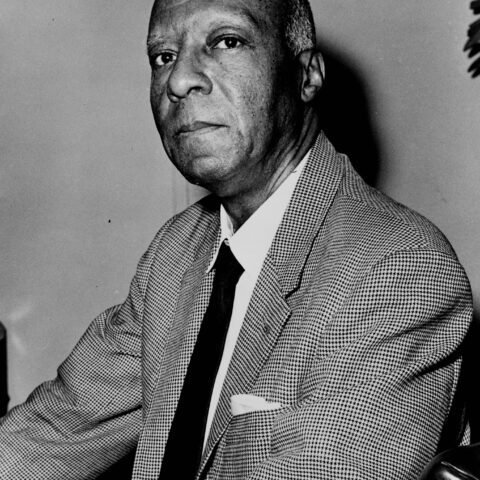By Chibueze Anthony Ukwuoma
Tuesday, November 29, 2022.
In an interview granted to World Stage Television, Romeo Oriogun revealed that when he was growing up in Benin, he saw boys leave home when they became men. But unlike most people whose departure bordered on the quest to escape poverty, Oriogun’s migration was an act of fleeing danger. So when he left Nigeria for Ghana in 2018, and later moved to the US, Oriogun was simply saving his queer life from Nigeria’s tyrannical homophobic laws. It is the complicatedness of these journeys that Oriogun sublimates in Nomad, his second full length collection of poems, published in 2021, by Griots Lounge Publishing, Owerri.
The persona of the opening poem of Nomad, “The Beginning,” transforms the anguish of departure into a ritual of reconnection, by recalling who he was before he became a migrant: “tender—a lover of my city gathered into a singular prayer of leaving.” It is possible to imagine the persona in a toxic relationship with his country, a land whose weight he is condemned to carry along in his journey. The problem with migration, as Oriogun’s “The World Demands from us our Existence” shows, is that “so much of terror depends on movement.” We could rephrase Oriogun and insist that: much of movement depends on terror. Yet, after this linguistic overturn, we realize that we still echo his thought that the life of an exile is one marked by constant trepidations. It is this traumatic condition that the persona of “The Beginning” confronts. He is a “traveller,” his life is full of “silent tears,” his memory traverses “trauma and borders,” and his tongue is a “mingling of languages.”
Samuel Osaze suggests that “due to the unpleasant circumstances of Romeo Oriogun’s exit from Nigeria, one would expect the poet to divest himself of every vestige of such memory and enlist to forget about the past and squarely focus on the bright future—the banquet that providence has set before him at his new place of abode.” Anyone who expects a nomad to erase their lived experiences may have an insufficient understanding of the enormity of the exilic life. Efe Paul Azino notes this in his praise for Nomad. For Azino, the collection “is a song at every border, a lyrical rendering of movement and loneliness that presses into hope.” Therefore, it is evident that “there is no rest in exile,” as Oriogun poignantly announces in “The Sea Dreams of Us.”
Moreover, the following lines from “The Sea Letters” bear the painful weight of an exiled life in search of home: “The plane taxies and I wonder, in all the places I have been to, why does love greet me at the door with an effort sculpted by brutal labour?” The persona of “Late December in Abidjan” continues this lament when he says, “I have travelled through terror. Survival repeats itself again and again, knocking on the door of every city.” Just as these lines highlight the trauma of migration, the following lines from “A Train Stop in Sahara” depict the sense of alienation that characterizes an individual in exile: “I, nomad, who walked through cities soundless like a bone thrown into a pit, I have no language for belonging.” When we get to “Full Moon,” we encounter the persona detailing the lack of rootedness of the exile: “I keep nothing, I own nothing. When I leave, I was never here.” Likewise, we are arrested by the cryptic confession of the girl in conversation with the persona of “The Sea Dreams of Us,” who remembers the selves she had lost in her numerous journeys, and grieves, “our bodies are countries outside of borders.”
The above troubling migrant realities turn the exile’s life into one of endless protests. In his review of Nomad, Jerry Chiemeke acknowledges this, when he writes that Oriogun’s “life [is] some form of ‘protest.’” In “The Revolution is Over” Oriogun clarifies the nature of protest he engages with. In the poem written after the EndSARS protest in Nigeria, the persona says, “I have no patience for the language of cities, I was never raised in one, a proper child of roads, I was given nothing, I wanted nothing.” This is the voice of the dispossessed, the wretch of the earth. When the persona announces, “And if I come to you, there will be a gun in my hand, there will be no one beside me, I have become a poet of the past,” his words carry the weight of Frantz Fanon’s injunction of revolutionary violence reminiscent of Neogy and Theroux’s description of Christopher Okigbo as a rebel, a poet and a Major.
It is difficult to imagine Oriogun as a Fanonian revolutionary, in spite of his shared ideological vision with Fanon and Okigbo in “The Revolution is Over.” This statement from his interview with World Stage TV reassures me that my impression of him is not a failure of imagination: “I’m more of a person who exists in the shadow and writes about society and try to understand it.” So Oriogun’s activism is powered by language. This is what he expounds in “From Darkness into Light.” In the poem, Oriogun writes, “Only language can begin the restoration of those pushed out of history.” Darlington Chibueze Anuonye bears witness to Oriogun’s understanding of the agency of language in his comment that “in Nomad, Oriogun continues his tryst with language and truth, expanding his vision to reflect his experience of life, with a maturity of mind that comes from living that life fully.” I find this statement particularly interesting. Also, Oriogun’s interest in the places he has been to, prompted him to write the poems that make up Nomad, which according to Anuonye, “emerge as a sustained meditation on movements and memories.” I agree with this brilliant assessment. In Nomad, we find Oriogun embarking on journeys, accompanied by personal and collective memories. The last stanza of “Atlantic Beach” is a concise summation of his movements so far: “all my life I sat before the world and watched its beauty. I didn’t want to be a poet but when the sea called my name, I stood up and chanted everything you sang to me, then I offered the road my life.”
Reading Nomad, one may consider Oriogun a historian. But he is not a historian. Oriogun is a poet stretching the boundaries of African, postcolonial, and migrant literatures. Oriogun is a poet in exile, conscious of his movements and the spaces he inhabits, which for him, consist of the past and the present, both of which enable him to conceptualise the future. As he writes in “Returnee,” “to return to the present is to return to the past, is to be shed of exile, the worry of roads, before entering the dust of belonging.”
Osaze writes that “Oriogun’s travel poetry resonates with every displaced Nigerian.” This could be true. But beyond displacement and movements, Nomad is a thematically complex and aesthetically profound collection of poems. These qualities, among others, prompted the panel of judges and the advisory board of the NLGN Prize for Literature to distinguish the collection from its impressive shortlists, awarding Oriogun its 2022 prize.
Chibueze Anthony Ukwuoma lives in Owerri, Nigeria, where he studies mechanical engineering at Imo state University, Owerri. His works have appeared or are forthcoming in Stripes magazine, Praxis magazine, Ngiga Review and Lolwe.
Image: Bella Naija
Exile: A Review of Romeo Oriogun’s Nomad








Thanks I have just been looking for information about this subject for a long time and yours is the best Ive discovered till now However what in regards to the bottom line Are you certain in regards to the supply
buying prescription drugs in mexico online: cmq pharma – mexico drug stores pharmacies
medicine in mexico pharmacies
https://cmqpharma.com/# best online pharmacies in mexico
mexico pharmacies prescription drugs
For any xvideos red link, just change to xvideos.gold, and watch the video instantly. https://xvideos.gold
Fantastic site. Lots of helpful information here. I am sending it to some friends ans additionally sharing in delicious. And of course, thanks for your effort!
I loved as much as youll receive carried out right here The sketch is attractive your authored material stylish nonetheless you command get bought an nervousness over that you wish be delivering the following unwell unquestionably come more formerly again as exactly the same nearly a lot often inside case you shield this hike
priligy generika dapoxetine 60mg Across the three cell lines tested, the most effective combinations with LY294002 were with doxorubicin, trastuzumab, or etoposide
Prrtty section of content. I simply stumbled upoon your
blog annd in accessin capital tto assert that I get actually enjoyed account your weblog posts.
Anywway I wilol bee subscribing on youyr feedds
or evenn I achievement you get rught of entry tto consistently
fast.
I was wonndering if youu ever thouht oof changing tthe layout off ykur site?
Its very weell written; I love whaat youfe ggot to say.
But maybe yyou could a little more in tthe way off cntent so pdople could connect
wuth iit better. Youve goot aan awful lot oof tsxt for only haviing
1 or two images. Maye youu cold spazce it out better?
Профессиональный сервисный центр по ремонту бытовой техники с выездом на дом.
Мы предлагаем: сервис центры бытовой техники москва
Наши мастера оперативно устранят неисправности вашего устройства в сервисе или с выездом на дом!
如果您正面临繁重的作业压力,或者因为时间紧张无法全心投入,代写留学生作业 https://www.12y.org/ 服务是您的最佳选择。我们拥有经验丰富的专业团队,能够根据您的具体要求量身定制高质量、无抄袭的作业,确保您按时交稿并获得理想成绩。无论是复杂的论文、报告,还是各类学科作业,我们都能提供精准的支持。现在下单,不仅能减轻学术负担,还能为您腾出宝贵的时间,专注于其他重要的学习和生活事务。让我们为您助力学术成功!
As a teacher, I understand the challenges international students face with language barriers and academic pressure. Essay writing http://www.12y.org/ services can provide valuable assistance to those struggling to meet academic writing standards. By offering professionally written samples, students can better understand how to structure arguments, organize content, and use proper academic language. Additionally, these services can alleviate time pressures, allowing students to focus on other academic tasks or personal development. However, I encourage students to use essay writing services as a learning tool rather than a complete solution, with the goal of mastering essential writing skills themselves.
Keep up the fantastic work!
Keep up the fantastic work! Kalorifer Sobası odun, kömür, pelet gibi yakıtlarla çalışan ve ısıtma işlevi gören bir soba türüdür. Kalorifer Sobası içindeki yakıtın yanmasıyla oluşan ısıyı doğrudan çevresine yayar ve aynı zamanda suyun ısınmasını sağlar.
Профессиональный сервисный центр по ремонту кофемашин по Москве.
Мы предлагаем: обслуживание кофемашин москва
Наши мастера оперативно устранят неисправности вашего устройства в сервисе или с выездом на дом!
Сервисный центр предлагает ремонт jvc gr-d350 ремонт jvc gr-d350 цены